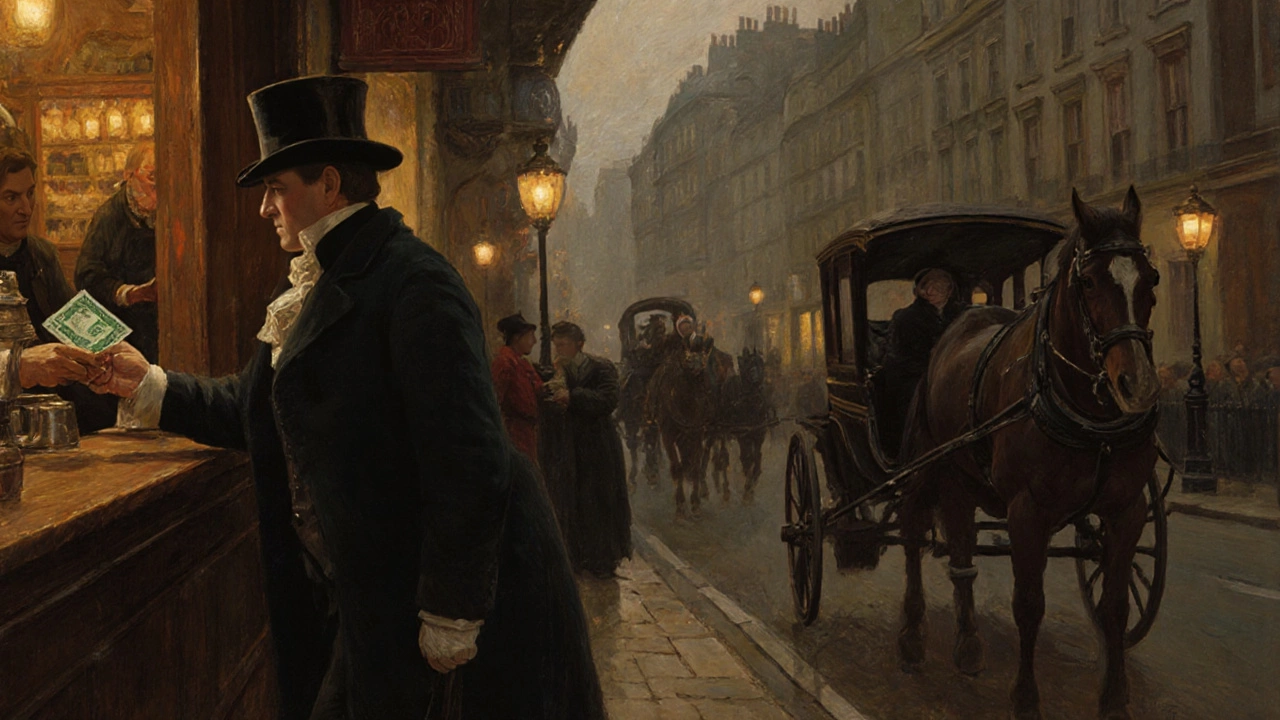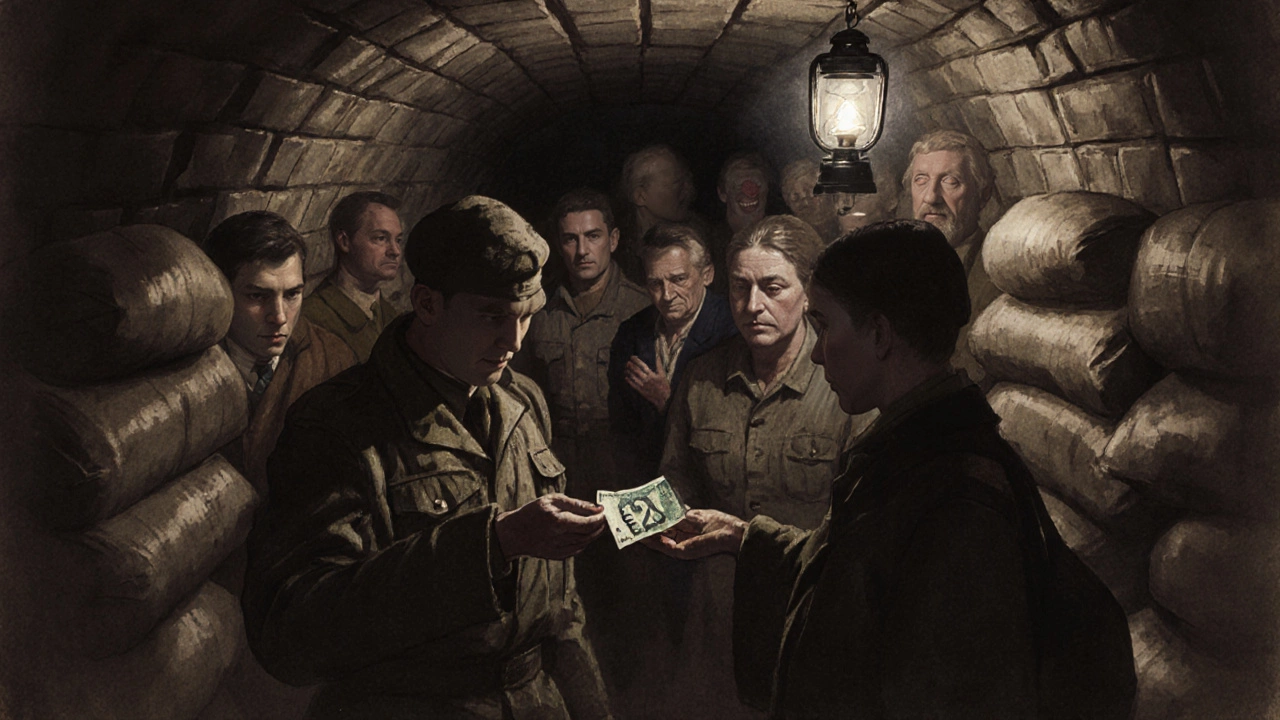Why Is 25 Pounds Called a Pony? Uncovering the British Slang Origin

UK Money Slang Converter
Enter a monetary value in pounds to see its slang term equivalent.
Common UK Money Slang Terms
| Slang Term | Value (£) | Description |
|---|---|---|
| Fiver | 5 | Five-pound note |
| Tenner | 10 | Ten-pound note |
| Pony | 25 | Twenty-five-pound note |
| Monkey | 500 | Five-hundred-pound note |
| Grand | 1000 | One-thousand-pound note |
TL;DR
- A "pony" is UK slang for a £25 note.
- The term likely stems from 19th‑century horse‑trading and betting jargon.
- World Wars and Cockney rhyming slang helped spread the nickname.
- It lives alongside other colourful money slang like "fiver," "tenner," and "monkey."
- Today you’ll still hear it in pubs, markets, and online chats.
Ever wondered why a 25‑pound note is called a pony? The nickname isn’t about horses at all - it’s a quirky slice of British slang that has survived wars, street markets, and even the internet. Below we break down the history, the clues that point to its origin, and how the term is used today.
pony (slang) is a colloquial British term for a £25 banknote. It sits inside a larger family of money nicknames that make talking about cash feel a bit like a pub game.
What Exactly Is a "Pony"?
In everyday conversation, a "pony" means a twenty‑five pound note - the slightly larger cousin of the ten‑pound note but smaller than the fifty. The word doesn’t appear in official banking language; it lives purely in informal speech, especially among market traders, cheeky friends, and anyone who enjoys a good slang shortcut.
Where Did the Name Come From?
There’s no single documented decree that declared a £25 note a pony. Instead, historians piece together clues from 19th‑century Britain, horse‑trading slang, and wartime language shifts.
1. Horse‑Trading Roots
Back in the 1800s, the term "pony" was already used to describe a small, inexpensive horse - a work animal that cost about a quarter of a larger mare’s price. In bustling market towns, a low‑cost pony might fetch roughly 25 shillings, a figure that loosely translates to the modern £25. Over time, traders began using the animal’s name as a shorthand for that price tag.
At the same time, betting on horse races was a national pastime. A wager of 25 shillings was often called a "pony bet" because it matched the price of a riding pony. When the UK switched to decimal currency in 1971, the old 25‑shilling reference shifted to the nearest new note - the £25.
2. Influence of Cockney Rhyming Slang
Cockney rhyming slang is a playful form of London street slang where a phrase rhymes with the intended word. While "pony" isn’t a perfect rhyme for "twenty‑five," the pattern of using an unrelated, often animal‑related term fits the rhyming tradition. Some linguists argue that the nickname emerged in the East End, where colorful monikers for money were a way to speak out of earshot of authority.
3. War‑Time Word‑Play
During World War I, soldiers from the British Empire spent leisure time in canteens and on the home front, inventing whimsical nicknames for cash to keep spirits up. A letter from 1916 mentions soldiers referring to a "pony" when passing small sums for cigarettes. The term resurfaced strongly in World WarII, when rationing made cash handling a daily concern. Soldiers and civilians alike used brief slang to keep conversations fast and discreet, cementing "pony" in the popular lexicon.
Both wars also spread regional slang across the country as troops traveled. This diffusion helped the term move from coastal markets to inland towns, making it a truly national nickname.
Other Money Nicknames You Might Hear
British slang loves turning numbers into characters. Below is a quick side‑by‑side look at the most common nicknames, their value, and the likely origin.
| Slang | Value | Likely Origin |
|---|---|---|
| Fiver | £5 | Simple abbreviation of "five" |
| Tenner | £10 | Short for "ten pound note" |
| pony | £25 | Horse‑trading price, wartime slang |
| Monkey | £500 | Possibly from Indian rupee slang during colonial times |
| Grand | £1,000 | Short for "grand total"; US influence |

Modern Usage - Where Do You Hear "Pony" Today?
Even in 2025, you’ll catch the term in pubs, farmers' markets, and online forums. A typical exchange might go:
“I’m short on cash, can you spot me a pony for the bus?”
It’s also show‑up in British TV sitcoms and radio comedy sketches, reinforcing its place in popular culture. Younger generations sometimes swap out the term for "twenty‑five," but the nickname endures, especially among older shoppers and traders who enjoy a bit of linguistic heritage.
For those learning English, knowing slang like "pony" can make conversations feel more authentic and help you understand jokes that would otherwise go over your head.
Common Misconceptions
- It’s not about an actual horse. The link is purely historical, not zoological.
- It isn’t a regional term only. While it started in certain markets, the nickname is now nationwide.
- It isn’t a new invention. References date back over a century, showing its deep roots.
Quick Cheat Sheet - Money Slang at a Glance
- Fiver - £5
- Tenner - £10
- Pony - £25
- Monkey - £500
- Grand - £1,000
Keep this list handy the next time you’re haggling at a market stall or chatting with a friend about cash.
What to Do If You Hear a New Slang Term
- Ask the speaker for clarification - most people love explaining their slang.
- Check reputable British slang dictionaries or forums; many maintain up‑to‑date glossaries.
- Listen for context clues - often the surrounding conversation hints at the value.
- Try using the term yourself; practice makes it stick.
Frequently Asked Questions
Why is a £25 note not as common as other denominations?
The Bank of England stopped issuing the £25 note in the early 1990s due to low demand and the rise of electronic payments. That scarcity helped preserve the nickname “pony” as a nostalgic reference.
Is "pony" used in other English‑speaking countries?
Not really. It’s a uniquely British nickname. In Australia, New Zealand, or Canada you’ll hear different slang (e.g., “fob” for a $100 note in Australia).
Does the term "pony" ever refer to a different amount?
Occasionally, older generations might stretch it to mean any amount around £20‑£30, but the widely accepted value remains £25.
How does "pony" compare to other slang like "monkey"?
Both are animal‑based nicknames, but a "monkey" represents a much larger sum (£500). The contrast highlights the range of British money slang, from modest “fiver” to hefty “grand.”
Will the term "pony" disappear with cashless payments?
Probably not entirely. Slang often survives as cultural heritage, appearing in jokes, TV scripts, and nostalgia‑driven conversations even if the physical note is rare.





